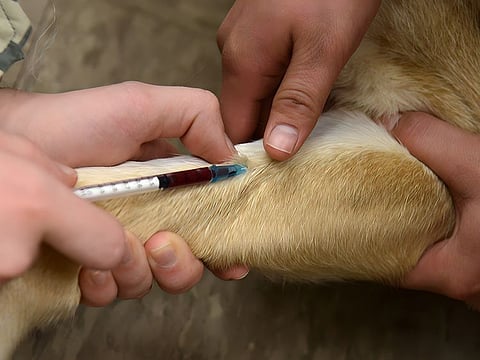VacciCheck: Why it’s your best shot
A quick VacciCheck titer test can tell you if your dog has enough antibody levels

Highlight
A quick VacciCheck titer test can tell you if your dog has enough antibody levels to protect it from parvovirus, distemper, and infectious hepatitis, says Paul Sowerby, Co-Founder, My Second Home
After a string of expletives, the first words that tend to spring to mind immediately after we’ve stood on a dirty nail or gashed our hand on a rusty metal can, are: ‘when did I last have a tetanus jab?’
Which is odd given that we’re told the vaccine can protect us for a decade — and even longer if we’ve had a booster. In fact, new science suggests that cover may be in place for up to 30 years.
Maybe it’s because ‘can’ and ‘may’ don’t sit comfortably alongside the infection’s wretched symptoms of jaw lock, muscle spasms, seizures, fever, loss of swallow reflex, and then often, death. Perhaps we’re not content with just assuming that our level of protection is adequate and so often choose to get ‘topped-up’ just to be on the safe side - particularly if we’re considered to be ‘at risk’.
And so it is with our beloved dogs.
If they’ve had the DHP vaccines against the horrible trio of distemper, hepatitis and parvovirus, we’ve historically assumed and hoped everything was OK. And it usually was.
However, as our amazing vet partners continue to tell us, there are two factors involved when a canine vaccine is used to create immunity. The first is the efficacy of the vaccine itself — aka where was the batch made, how old was it, and has it worked? The second factor is your dog — does its immune system work?
With 3,000 members and their dogs committed to our care — and hundreds in our day care, boarding, and dog park facilities at any one time, we’re simply not prepared to settle for ‘can’ and ‘may’.
That’s why we rely on a quick and simple VacciCheck in-clinic titer test to
allow your vet to reassure us all that your dog has enough antibody levels to protect it from parvovirus, distemper, and infectious hepatitis.
And at MySecondHome, we’ve made it compulsory.
But boy, do we get some grief!
We’re ‘over-cautious’, we’re ‘just in it to make more money for vets’, we’re ‘up ourselves and just trying to be awkward’ and would you believe, just occasionally, we’re even ‘trying to prove that we’re better than all the others’.
In fact, we’re none of those.
What we are, is a very conscientious pet care resort group that has an impeccable record for avoiding outbreaks of diseases that have beleaguered Dubai several times during the past eight years and in some cases crippled or closed other facilities.
Our General Manager Sean Parker is deeply committed to making sure everyone grasps the fact that vaccination or revaccination is by no means an assurance that an animal is protected.
“Our vets tell us they’ve seen countless dogs that have been vaccinated repeatedly and yet have no antibody,” he said. “And it’s often unclear why. Sometimes, it’s because the vaccine didn’t do what it says on the label. Other times the dog was unable to mount an immune response because of its genes, nutritional status, stress levels when vaccinated, immune-suppressant drugs that it was being given at the time of vaccination, or a host of possible other health issues. In puppies that have been vaccinated too early it could be because the mother’s own antibodies compromised the vaccine.
“When we know for sure that antibodies are present at the minimum level, we can be certain that the dog’s body will bring an infection under control. We can’t understand why anybody or any dog care facility would want to leave that to chance.”



